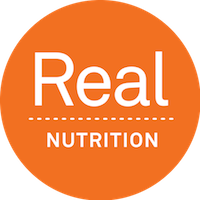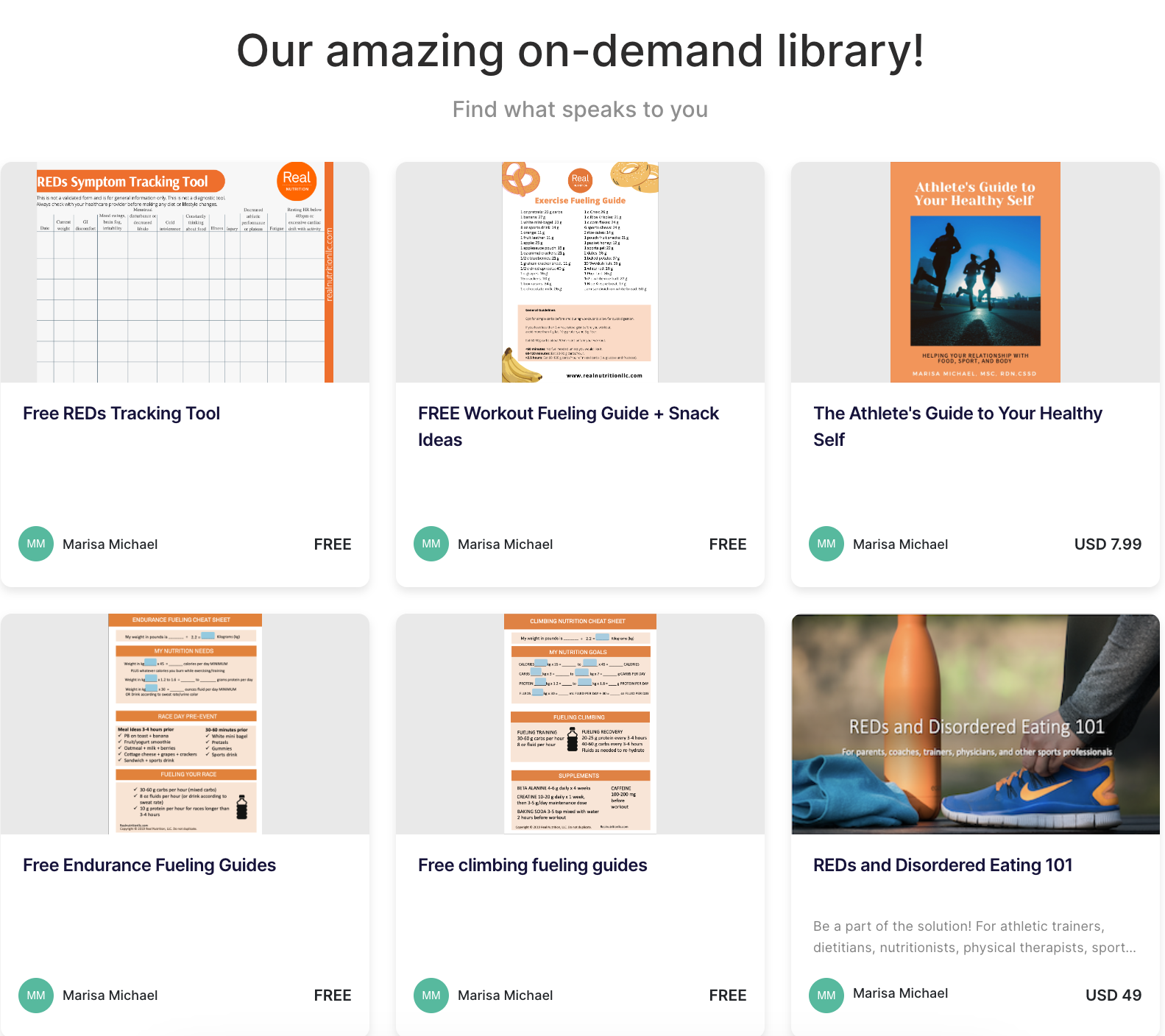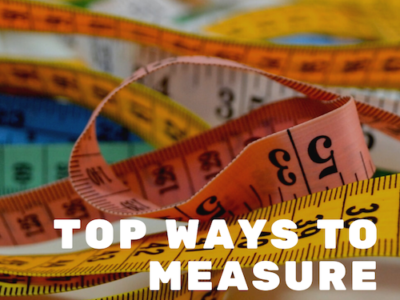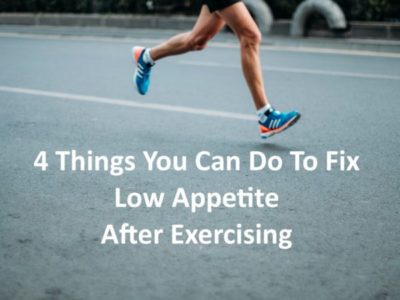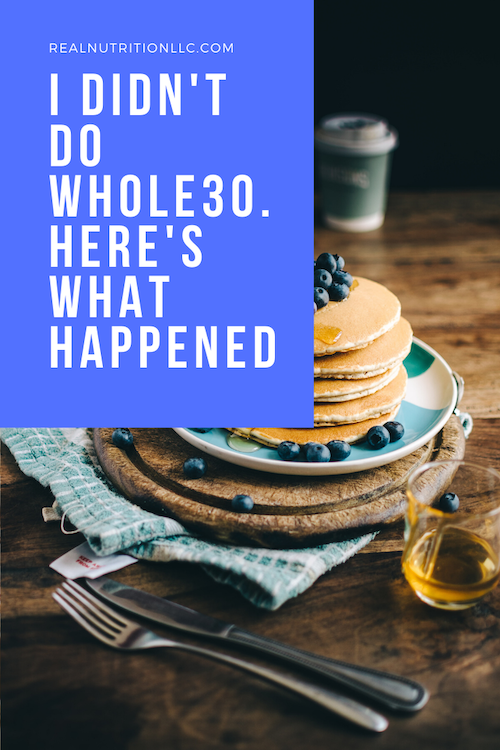
If you start “researching” Whole30 a bit (researching is in quotes, because, let’s be honest, most people don’t do actual clinical research, or even crack open a PubMed page, they just read a few webpages), you’ll find no shortage of glowing testimonials. Whole30 claims it can help with a whole host of health issues: allergies, fatigue, migraines, gut health, hormones, immune health, metabolism, high blood pressure, PCOS, endometriosis, ADD, ulcerative colitis, bipolar disorder, and Type 1 and Type 2 diabetes, and more.
Wow! What’s this one-size-fits-all-diagnoses miracle diet?
Umm, there’s not one. But Whole30 is all that and a bag of chips. Oh wait, you can’t have those on the Whole30 diet.
Whole30 claims that “95% of participants lose weight…without restricting calories.” Ok, that is biologically impossible. In order for weight loss to occur, a person HAS to be in a calorie deficit. Whole30 also claims you need to “eliminate foods deemed…by scientific literature have deemed the most commonly problematic.” Problem is, there is not one single scientific reference to back this up.
Interestingly, dairy (a no-no on Whole30 because it is “inflammatory”) is actually very much anti-inflammatory and associated with decreased risk of disease. Grains, also forbidden on Whole30, are also incredibly healthful. Salt, another forbidden item, is essential for humans, as well as the iodine it provides if you purchase iodized salt. The website claims that “salt has sugar in it” so you can’t have it. Salt has a small amount of dextrose in it, which is a physiologically insignificant dose, and it’s already well-established that carbohydrates are essential for your body. Also you could buy salt without dextrose if you really cared about this.
Aside from the dubious health claims, Whole30 is astonishingly unethical in its claims.
If someone truly has a medical issue such as ADD, hypertension, or diabetes, they need proper medical care with an evidence-based diet and correct medications. A person with Type 1 diabetes needs insulin, not weird diet rules. I’m surprised Melissa Hartwig Urban’s license for practicing healthcare hasn’t been revoked yet. Oh wait, she never had one.
Whole30 also ignores basic organic chemistry when it forbids all forms of sugar and sweeteners, as well as a slew of carbohydrates (but then strangely allows some of them back again–coconut sugar is forbidden, but then scroll down the page and fruit juice and coconut syrup is ok). If you know anything about basic nutrient metabolism, you will know that Whole30 is a whole sham that contradicts itself left and right. Read here for an excellent review on the diet.
I decided NOT to try Whole30, and here’s what happened!
I preserved my relationship with food!
Whole30 claims to provide “food freedom” (whatever that means), but with all these restrictions (no grains, no dairy, no legumes, no sugar, no alcohol, no vinegar, no salt (umm, your body needs salt). This doesn’t sound like food freedom to me. This sounds like a slippery slope to orthorexia and eating disorders. Read here why Whole30 can actually make your health worse.
I have true food freedom when I decided not to try Whole30. I ate what a felt like, as much as a felt like, when I felt like it. I ate nourishing grains and legumes that kept my bowels regular and provided me with nutrients. Restaurants and social situations were a joy, not a chore.
I felt connection with family and friends, as well as my culture, as I celebrated Christmas with traditional food that is so much more than the nutrients it provides.
I kept my stress hormones low.
Since I wasn’t worried about if my food was “Whole30 approved,” my stress level over food was low to non-existent. Overall stress may contribute to poorer health outcomes. Even debating whether to eat a cookie and restraining yourself when you really want it can raise salivary cortisol levels (cortisol is a stress hormone).
Whole30 is full of shame-based recommendations and fear mongering, which I felt blissfully free of while not following the diet.
My blood inflammatory markers were low.
I’ve always been curious about this, so I got my blood tested for something called C-reactive protein and erythrocyte sedimentation rate. Both of these tests can indicate levels of inflammation in the body. Both of these test results were perfectly fine! This flies in the face of Whole30 logic. I eat grains, dairy, legumes, and sugar on a regular basis (I love myself some ice cream). Oh wait, that’s right–grains, dairy, and legumes are anti-inflammatory! Whole30 is dead wrong on its claims.
I was energized during my workouts.
In addition to eating enough overall calories to fuel my training, I included enough carbohydrate from grains, dairy, and legumes (and yes, sugar as a quickly-digesting carb during long training sessions). This fueled my workout, replenished glycogen stores after my workout, kept blood sugars normal during my workout, and supported lower cortisol levels.
My food budget was manageable.
I didn’t have to worry about buying different foods, “Whole30 approved” foods, or expensive copy-cat versions of normal foods. I bought what I enjoy. Grains and legumes are incredibly inexpensive and nourishing.
I saved time grocery shopping and meal planning.
Whole30 is a convoluted nightmare of label-reading and food-rule-checking. The rules are inconsistent from a nutrition and biology standpoint, which makes them hard to understand and remember. No butter, but you can have clarified butter (say whaaa?). No treat made from Whole30-approved ingredients, but you can eat any Whole30 ingredient (also what?). These rules make shopping and meal prep a stressful chore that may be more harmful to your mental and physical health. Hard pass.
I didn’t have any nutrient deficiencies.
Since I was eating a wide variety of foods, that allowed me to get a wide variety of vitamins, mineral, fiber, antioxidants, phytonutrients, carbohydrates, amino acids, and healthful fats. All these things support my body and help it function properly. Thank you, food!
Check out our amazing nutrition resources, including on-demand courses, free downloads, and webinar replays.
- Nutrition for Climbers
- The Ultimate Guide to Useful Sports Supplements
- Ditch Diets and Become an Intuitive Eater
And be sure to follow us on Instagram!
Book an appointment with the dietitian
~This is general information only and not intended to be advice. Always check with your healthcare provider before undergoing any diet or lifestyle change.
